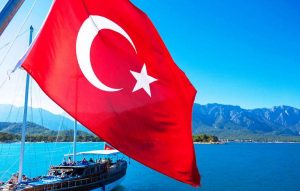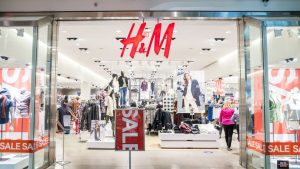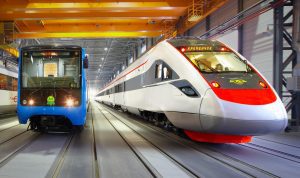
Minister of Foreign Affairs of Turkey Mevlut Cavusoglu said during a phone conversation with his Ukrainian counterpart Dmytro Kuleba that Turkey resumes regular passenger transportation with Ukraine from July 1, 2020, the Foreign Ministry of Ukraine has said.
“The foreign minister of Turkey informed [Kuleba] about the decision of the Turkish side to open its borders for foreign tourists and resume regular passenger transportation with Ukraine from July 1 this year. He also said that his country will create all necessary conditions for safe rest of Ukrainian citizens in summer,” it said on Monday.
The ministers also discussed the priority tasks of strategic partnership between Ukraine and Turkey in the near future, determined the key bilateral high-level events that will be held as soon as the epidemiological situation improves.
Kuleba and Cavusoglu also agreed to hold the next meeting of the joint strategic planning group at the level of foreign ministers of Ukraine and Turkey in Antalya.
They also discussed cooperation within international organizations, including the Council of Europe.

The surplus of Ukraine’s consolidated balance of payment in April 2020 reached $716 million, while in April 2019 the deficit was $46 million, according to preliminary data posted by the National Bank of Ukraine (NBU) on Friday. According to the report, the surplus of the current account of the balance of payment last month was $1.4 billion, and in April 2019 the deficit was $92 million.
The volume of exports of goods in April 2020 decreased by 4%(in March 2020 by 3.5%), to $3.6 billion. The decline was due to a decrease in the export of wood and wood products by 19.6% (by 11.7%), ferrous and non-ferrous metals – by 18.1% (by 13.1%) and engineering products – by 8.3% (by 13.3%), as well as a drop in exports of industrial products and chemical products by 24.2% and 2.5% respectively, which a month earlier had increased by 2.3% and 16.7%.
At the same time, in April, export of food products continued to grow – by 6.6% (by 2.3%) and mineral products – by 12.1% (by 3.5%).
In January-April 2020, exports to Asian countries increased in money terms (by $796 million, or 16.9%), while exports to the EU and the Russian Federation decreased by $555 million (9.7%) and $111 million (13.6%) respectively. Thus, the share of exports to Asian countries of total exports increased to 37% (from 31.3% for the same period in 2019), and to the EU and Russia decreased to 34.6% (from 38%) and to 4.7% (from 5.4%).
In April 2020, import of goods decreased more significantly – by 28.4% (in March – by 6%), to $3.4 billion, including energy imports decreased by 33.4% (in March – by 11.5%), and non-energy – by 28.6% (in March – by 4.8%).
Last month, in particular, imports of engineering products decreased by 28.7% (in March – by 2.6%), including cars by 33.4% (in March, it increased by 21.7%). In addition, exports of ferrous and non-ferrous metals decreased by 36.8% (in March – by 8.6%), industrial products by 23% (by 7.2%) and chemical products – by 17.5% (in March it grew by 2.1%).
At the same time, food imports continued to grow – by 2.1% after rapid growth in March by 20.9%.
According to the results of January-April 2020, imports from Russia (by $924 million, or 37.5%) and from the EU countries (by $314 million, or 4.5%) decreased the most in money terms, while Russia’s share of total imports decreased to 9.2% (from 13.2% according to the results of the corresponding period of 2019), and the EU increased to 40.8% (from 38.2%). At the same time, imports from Asian countries remained almost unchanged – it grew only by $34 million (or 0.8%), and its share of total imports – to 26.3% from 23.3%.
According to the report, the surplus in trade in services in April 2020 tripled to $555 million compared to April 2019, thanks to the higher rate of decline in imports of services (by half) compared to their exports (by 17.0%) due to the COVID-19 pandemic.
A decrease in imports of services occurred along with a 72.2% decrease in expenses of people traveling abroad and short-term migrants, as well as a decrease in transport and other business services by 31.3% and 41.2%, respectively.
At the same time, a decrease in the export of services was facilitated by a decrease in transport services (37.5%) and expenses of people traveling in Ukraine (95.7%), while the export of computer services continued to increase (by 21.3%).
According to the central bank, the surplus in the balance of primary income in April 2020 decreased by 10.4%, to $420 million compared to April a year earlier due to the predominance of a decrease in receipts from payroll (by $158 million) over payments on income from investments (by $120 million).
Net borrowing from the outside world (total current account balance and capital account) last month amounted to $1.4 billion, which is 93.4% less than in April 2019 ($91 million).

Life insurance companies of Ukraine in January-March 2020 collected UAH 1.253 billion of gross insurance premiums, which is 22.8% more than in the same period in 2019.
According to the report on the website of the National Commission for the State Regulation of Financial Services Markets, 95% of total insurance premiums came from individuals, 5% from legal entities.
For the first quarter of 2020, the number of insured individuals increased by 11.8% or by 543,326 people, to 5.132 million people.
During this period, life companies paid customers UAH 146 million, which is 0.1% less than for the same period in 2019
The value of changes in life insurance reserves amounted to UAH 851 million, which is 3.7 times more than a year earlier. In particular, investment income, which is used when calculating insurance tariffs, amounted to UAH 75.1 million (16.6% more), and indexation of the amount of insurance sums some UAH 20.5 million (26.3% less).
In the first quarter of 2020, six life insurance companies received a negative value of growth in life insurance reserves totaling UAH 7.9 million, which is associated with the early termination of insurance contracts (in the first quarter of 2019, while seven life insurers declared a negative value for the total amount of UAH 25.4 million).

The Swedish Hennes & Mauritz AB (H&M), the owner of Europe’s second largest clothing store chain, plans to open its fourth retail outlet in Ukraine on June 11 – the largest H&M store in the Ukrainian chain will be located in the Dream Town shopping and entertainment center, the press service of the shopping center said last week.
“On June 11, we will open a new store of the Swedish H&M chain, which will be the largest in Ukraine. So there will be a place for all departments: H&M Sport, H&M Mama, H&M +, LOGG and of course the big H&M Home,” Dream Town Director Yemets quoted in a message.
This will be the first H&M opening in Ukraine this year.
As reported, on September 12, 2019, H&M opened a store in the River Mall at 12, Dniprovska Naberezhna Street in the Darnytsky district of Kyiv, expanding the Ukrainian retail network to three stores. Its area was 2,900 square meters.
The Swedish retailer H&M entered the Ukrainian market in 2018, opening the first store with an area of 2,900 square meters in the Lavina Mall shopping center. The second brand store opened in October 2018 in the Sky Mall.

PJSC Kriukov Car Building Works (KCBW, Kremenchuk, Poltava region) saw a consolidated net income of UAH 74.5 million in January-March 2020, which is 76.2% less than in the same period in 2019 (UAH 310.75 million).
According to the interim reporting of the enterprise in the information disclosure system of the National Securities and Stock Market Commission, the net income from sales of products for that period decreased by 43%, to UAH 1.114 billion.
Consolidated gross profit decreased by almost 77.8%, to UAH 101.06 million, and operating profit decreased almost fivefold, to UAH 78.02 million.
The consolidated financial statements include, in addition to Kriukov Car Building Works (the parent company), its subsidiaries, namely, Instrumental Plant LLC (Kremenchuk) and V.N.V. LLC (Kyiv), in which 100% belongs to Kriukov Car Building Works.
The company said in the financial statements on its website that the current assets of the group by the beginning of April exceed its current liabilities by UAH 2.983 billion.
In the structure of net income from wagon constructing products, some UAH 1.058 billion was received (38.5% less than in the first quarter of 2019), including sales of main products, freight wagons, decreased by 47%, to UAH 871.5 million, while passenger wagons increased by 2.6 times, to UAH 187 million.
However, the sale of wagons in Ukraine significantly decreased by 70% compared with January-March of 2019, to UAH 487 million (the share in total sales decreased to 43.7% compared to 82.5%), and to the countries of Asia, to UAH 1.58 million compared to UAH 70.28 million. The sale of wagons to European countries grew by 2.3 times, to UAH 624.82 million (their share in total sales rose from 13.9% to 56%).
The number of wagons produced and sold in the first quarter is not given in the report.
Kriukov Car Building Works is the only company in the CIS that has established and operating production of passenger and freight rail wagons. It also produces regional diesel trains, high-speed interregional trains of locomotive traction, spare parts and carts for freight wagons.

MetinvestB.V. (the Netherlands), the parent company of the Metinvest mining and metallurgical group, received consolidated revenues declined by 11% in January-March 2020 compared to the same period in 2019, to $2.536 billion.
According to the preliminary unaudited consolidated financial statements released on Friday, May 29, the adjusted EBITDA was $373 million over the first quarter, which is 14% lower than during the same period in 2019.
Within the reporting period, consolidated revenues decreased mainly due to lower metal sales prices that followed the global benchmarks, as well as the effects of coronavirus (COVID-19) pandemic on business activity and steel demand in several strategic markets for the Group. Furthermore, resale volumes decreased. In addition, selling prices of coking coal concentrate and coke fell following a drop in coking coal benchmark quotations.
Moreover, the iron ore sales mix and geography were affected by weak demand in Europe and reduced pellet premiums. At the same time, Metinvest boosted its revenues from merchant iron ore concentrate due to higher sales volumes and selling prices amid global supply disruptions.
In the first quarter of 2020, revenues in Ukraine declined by 6% compared to the same period in 2019, to $726 million, mainly due to lower selling prices of steel products, coke and coking coal concentrate, as well as lower coke resale volumes. The share of Ukraine in consolidated revenues rose by 2 percentage points (p.p.), to 29%.
Other markets’ sales decreased by 13%, to $1.810 billion accounting for 71% of total revenue. In particular, revenues from Europe decreased by 23%, mainly due to lower selling prices of steel products and pellet premiums, as well as lower shipments of iron ore products (down 42%) and flat (down 7%) products. As a result, the region’s share in overall revenue declined by 5 p.p., to 32%.
The revenue of the metallurgical segment decreased by 14%, to $2.018 billion in the first quarter of 2020 mainly driven by lower sales of flat products ($203 million), coke ($59 million) and square billets ($33 million). Overall, the segment accounted for 80% of the overall top line, own 1 p.p. lower compared to the same period in 2019.
The mining segment’s revenues decreased by 2%, to $518 million, primarily driven by a lower contribution from pellets ($81 million) and other products and services ($34 million). This was partly compensated by greater revenues from iron ore concentrate ($88 million) and coking coal concentrate ($16 million). In the reporting period, the segment accounted for 20% of the overall top line, to 1 p.p. higher than the same period in 2019.
The group’s consolidated EBITDA amounted to $373 million in January-March, which is 14% lower than in January-March 2019. This was driven by a decrease in the Mining segment’s contribution of $89 million and an increase in eliminations of $70 million. The metallurgical segment’s EBITDA increased by $98 million.
The decrease in consolidated EBITDA was primarily driven by lower average selling prices for Metinvest’s metal products, coke and coking coal concentrate, as well as weaker pellet premiums ($ 189 million) and the 9% year-over-year appreciation of the hryvnia against the U.S. dollar to an average of UAH 25.04 the U.S. dollar compared with UAH 27.30 per the U.S. dollar in January-March 2019 ($54 million). In addition, this was due to a 15% salary increase mainly for production personnel in April 2019 and corresponding social security expenses ($25 million), a deteriorated contribution from the Zaporizhstal JV ($11 million), as well as greater spending on goods transportation services ($10 million), mainly due to a 3.7 fold increase in iron ore sales volumes to Southeast Asia.
These factors were partially compensated by lower spending on raw materials by $152 million, mainly as a result of reduced purchase prices of coking coal, coke, scrap and iron ore materials ($93 million); lower consumption of coking coal due to a 12% y-o-y drop in coke output; lower y-o-y inventory destocking; and lower raw material transportation costs. It was also compensated by lower expenses on energy materials of $37 million, mainly due to a decrease in natural gas prices by 42% and PCI coal by 23%, a higher contribution from the Southern GOK JV ($14 million); greater sales volumes ($5 million), primarily iron ore and coking coal concentrate. In addition, a decrease in other expenses by $20 million, mainly amid lower repair and maintenance expenses.
In the first quarter of 2020, the consolidated EBITDA margin remained flat at 15% compared to the same period in 2019. The Metallurgical segment’s EBITDA margin increased by 5 p.p., to 8%, while the mining segment’s fell by 5 p.p., to 37%.
As of March 31, 2020, total debt was up 2% since the beginning of 2020, to $3.107 billion. This was mainly due to greater use of trade finance facilities ($31 million); a consolidation of Dnipro Coke’s debt ($28 million) after obtaining the controlling interest in the asset in March; and an increase in interest accrued under bonds ($20 million). Thus, in 2020, EUR 34 million has been secured for such purpose sat Ilyich Steel through two buyer credit facilities granted by Raiffeisen Bank International: one of EUR 24.4 million for up to 11 years for the construction of an air separation unit and vaporisation station covered by an export guarantee from France; and another of EUR 9.8 million for up to ten years for the purchase and installation of a hydraulic down coiler for the HSM1700covered by an export guarantee from Austria.
As of March 31, 2020, cash and cash equivalents amounted to $328 million (an increase of 20% since the beginning of 2020), net debt amounted to $2.779 billion (an increase of 1% from the beginning of 2020), and the ratio of net debt to EBITDA for the last 12 months amounted to 2.4x (an increase of 0.1x from the beginning of 2020).